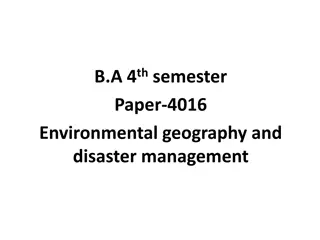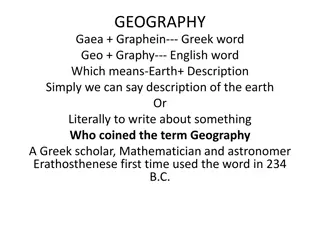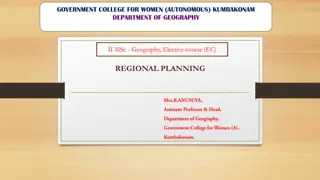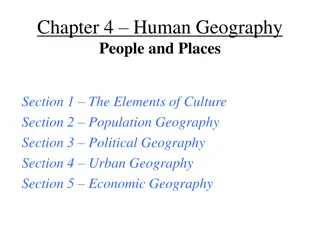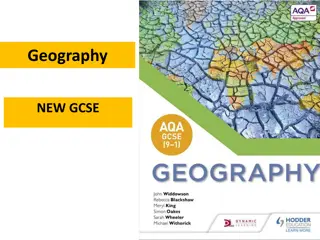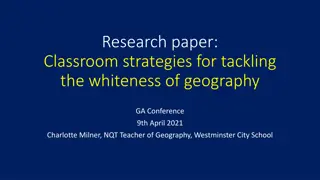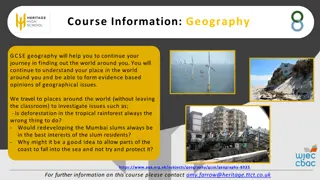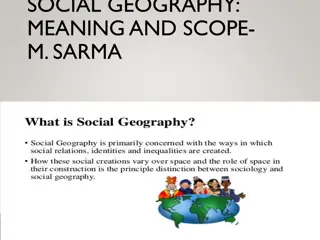Humanism in Geography: Methodology and Themes
Humanistic geography emerged as a critique of mechanistic spatial models during the quantitative revolution, emphasizing human agency, consciousness, and creativity in understanding the complexities of human-place relationships. It rejects geometric determinism and celebrates individual dignity, proposing a subjective approach to interpreting man-space interactions through historical lenses and cultural significance. Rooted in the humanities, humanistic geography aims to capture the essence of human experiences within their environments.
Download Presentation

Please find below an Image/Link to download the presentation.
The content on the website is provided AS IS for your information and personal use only. It may not be sold, licensed, or shared on other websites without obtaining consent from the author.If you encounter any issues during the download, it is possible that the publisher has removed the file from their server.
You are allowed to download the files provided on this website for personal or commercial use, subject to the condition that they are used lawfully. All files are the property of their respective owners.
The content on the website is provided AS IS for your information and personal use only. It may not be sold, licensed, or shared on other websites without obtaining consent from the author.
E N D
Presentation Transcript
Humanism in Geography: Methodology and Themes in Humanistic Geography! Humanistic geography developed due to a deep dissatisfaction with the mechanistic models of spatial science that had developed during the quantitative revolution. The cultural and historical geographers attacked the positivism from the early 1970s. In fact, it was a rejection of the geometric determinism in which men and women were made to respond automatically to the dictates of universal spatial structures and abstract spatial laws. The followers of spatial science (positivists) treated people as dots on a map, data on a graph, and number in an equation. It was at the same time a claim for a human geography with the human being at its very centre, a people s geography, about the real people and for the people to develop human being for all. One of the first geographers to attract a wide audience with his advocacy of a humanistic approach was Kirk (1951). But, it was Tuan (1976) who argued for humanistic geography. The term humanistic geography was used for the first time by Yi-Fu-Tuan in 1976. The focus of humanistic geography is on people and their condition. For Tuan, humanistic geography was a perspective that disclosed the complexity and ambiguity of relations between people and place (man and environment). Humanistic geography gives central and active role to human awareness and human agency, human consciousness and human creativity. It is an attempt at understanding meaning, value and the human significance of life events. In the humanistic strand, the intent has been to understand and recognize the dignity and humanity of the individual.
Humanists explain and interpret man and space relationship mainly with historical approach. Humanism does not treat humans as machines. It is a subjective approach which aims at verstehn, at an understanding of man in his environment. Humanism is a conviction that men and women can best improve the circumstances of their lives by thinking and acting for themselves, and especially by exercising their capacity for reason (Ralph, 1981). As stated above, humanism in geography developed as a criticism against positivism and quantitative revolution in geography. The basic objection of humanists against quantitative revolution is that its tools and assumptions do not adequately explain human world and human issues, especially those relating to social institutions, attitudes, morals, customs, traditions and aesthetics. Humanistic geographers propose that reasoning in humanistic geography should conserve contact with the world of everyday experience and recognize, if not celebrate, the human potential for creativity. The followers of this approach consider geography as the study of the earth as the home of man . Humanistic geography is thus not an earth science in its ultimate aim. It belongs to the humanities and the social sciences to the extent that they all share the hope of providing an accurate picture of the human world. In humanities the scholars gain insight into the human world by focusing what man does supremely well in the arts and logical thought. In fact, in humanities, knowledge of human world is acquired by examining social institutions. These institutions can be viewed both as example of human inventiveness and as forces limiting the free activity of individuals.
The methodology of humanists is characterized with: (a) A self-conscious drive to connect with that special body of knowledge, reflection and substance about human experience and human expression, about what it means to be a human being on this earth, namely, the humanities. ADVERTISEMENTS: (b) Its methods are essentially those of literary criticism, aesthetics and art history. It is essentially based on hermeneutics (the theory of interpretation and clarification of meanings). (c) Its interest is the recovery of place and the iconography (the description and interpretation of landscape to disclose their symbolic meanings), of landscape. In other words, the interpretation of the landscape as a carrier and repository of symbolic meaning, widening the traditional definitions of iconography the study, description, cataloguing and collective representation of portraiture as revealing of the prevailing aesthetic of an age to include the landscape specifically. (d) It lays emphasis on participant observation, interviewing, focus groups discussion, filmed approaches and logical inferences, rather than statistical and quantitative techniques for establishing correlation between people and place (environment).
It is a philosophy which seeks to disclose the world as it shows before scientific inquiry, as that which is pre-given and presupposed by the sciences. (f) Humanists argue that objectification is never the simple exercise which conventional forms of science assume them to be. Themes in Humanistic Geography: Scientific approaches like positivism, empiricism, and quantification tend to minimize the role of human awareness and knowledge. Humanistic geography, by contrast, especially tries to understand how geographical activities and phenomena reveal the quality of human awareness. Humanistic geography does not consider human being as an economic man. The propounder of humanistic geography (Tuan) explored five themes of general interest to geographers, namely: (i) geographical knowledge (personal geographies), (ii) territory and place, (iii) crowding and privacy, (iv) livelihood and economics, and (v) religion.









